Fleurs du Mal Magazine


Or see the index
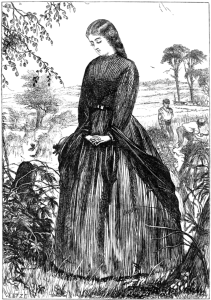
Song
What can it mean?—that glance so tender,
Out of the depths of two soft dark eyes;
Can it be earnest of heart-surrender,
Making me blest with a sweet surprise?
What can it mean?—white hands caressing
Between them a hand that is scarred and brown:
Is it a dream?—two soft lips pressing
That hard rough hand while the tears fall down.
What can it mean?—you kneel beside me,
Laying your dear head upon my breast,
Giving me all that you once denied me!
Is it, sweetheart, is it love confessed?
Evelyn Forest
(Pen name of Anne Pares)
( …-… unknown)
Song
Illustration: Frederick Eltze (1836–1870)
• fleursdumal.nl magazine
More in: # Classic Poetry Archive, Archive E-F, Archive E-F, Archive O-P, Archive O-P
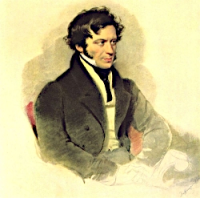
Kuß
Auf die Hände küßt die Achtung,
Freundschaft auf die offne Stirn,
Auf die Wange Wohlgefallen,
Sel’ge Liebe auf den Mund;
Aufs geschloßne Aug’ die Sehnsucht,
In die hohle Hand Verlangen,
Arm und Nacken die Begierde,
Übrall sonst die Raserei.
Franz Seraphicus Grillparzer
(1791 – 1872)
Kuß
• fleursdumal.nl magazine
More in: # Classic Poetry Archive, Archive G-H, Archive G-H, Grillparzer, Franz
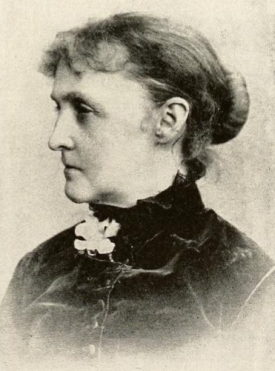
The Palace-Burner
A picture in a newspaper
She has been burning palaces. “To see
The sparks look pretty in the wind?” Well, yes—
And something more. But women brave as she
Leave much for cowards, such as I, to guess.
But this is old, so old that everything
Is ashes here—the woman and the rest.
Two years are—oh! so long. Now you may bring
Some newer pictures. You like this one best?
You wish that you had lived in Paris then?
You would have loved to burn a palace, too?
But they had guns in France, and Christian men
Shot wicked little Communists like you.
You would have burned the palace?—Just because
You did not live in it yourself! Oh! why
Have I not taught you to respect the laws?
You would have burned the palace—would not I?
Would I? Go to your play. Would I, indeed?
I? Does the boy not know my soul to be
Languid and worldly, with a dainty need
For light and music? Yet he questions me.
Can he have seen my soul more near than I?
Ah! in the dusk and distance sweet she seems,
With lips to kiss away a baby’s cry,
Hands fit for flowers, and eyes for tears and dreams.
Can he have seen my soul? And could she wear
Such utter life upon a dying face:
Such unappealing, beautiful despair:
Such garments— soon to be a shroud—with grace?
Has she a charm so calm that it could breathe
In damp, low places till some frightened hour;
Then start, like a fair, subtle snake, and wreathe
A stinging poison with shadowy power?
Would I burn palaces? The child has seen
In this fierce creature of the Commune here,
So bright with bitterness and so serene,
A being finer than my soul, I fear.
Sarah Morgan Bryan Piatt
1836–1919
The Palace-Burner
A picture in a newspaper
Poem
• fleursdumal.nl magazine
More in: # Classic Poetry Archive, #Editors Choice Archiv, Archive O-P, Archive O-P, Photography

Gentilesse
The firste stok, fader of gentilesse —
What man that desireth gentil for to be
Must folowe his trace, and alle his wittes dresse
Vertu to love and vyces for to flee.
For unto vertu longeth dignitee
And noght the revers, saufly dar I deme,
Al were he mytre, croune, or diademe.
This firste stok was ful of rightwisnesse,
Trewe of his word, sobre, pitous, and free,
Clene of his gost, and loved besinesse,
Ayeinst the vyce of slouthe, in honestee;
And, but his heir love vertu as dide he,
He is noght gentil, thogh he riche seme,
Al were he mytre, croune, or diademe.
Vyce may wel be heir to old richesse,
But ther may no man, as men may wel see,
Bequethe his heir his vertuous noblesse
(That is appropred unto no degree
But to the firste fader in magestee,
That maketh hem his heyres that him queme),
Geoffrey Chaucer
(1343 – 1400)
Gentilesse
• fleursdumal.nl magazine
More in: # Classic Poetry Archive, Archive C-D, Archive C-D, Geoffrey Chaucer

An den Mond
Wandle, wandle, holder Schimmer!
Wandle über Flur und Au,
Gleitend, wie ein kühner Schwimmer,
In des stillen Meeres Blau.
Sanft im Silberglanze schwebest
Du so still durchs Wolkenmeer,
Und durch deinen Blick belebest
Du die Gegend rings umher.
Manchen drücket schwerer Kummer,
Manchen lastet Qual und Pein;
Doch du wiegst in sanften Schlummer
Tröstend ihn, voll Mitleid, ein.
Sanfter, als die heiße Sonne,
Winkt dein Schimmer Ruh und Freud,
Und erfüllt mit süßer Wonne,
Tröstung und Vergessenheit.
Hüllst in dichtbewachsnen Lauben
Mit der sanften Fantasie
Ganz den Dichter; machst ihn glauben,
Seine Muse weiche nie.
Franz Seraphicus Grillparzer
(Wien 1791 – 1872)
An den Mond (Gedicht)
• fleursdumal.nl magazine
More in: # Classic Poetry Archive, Archive G-H, Archive G-H, Grillparzer, Franz
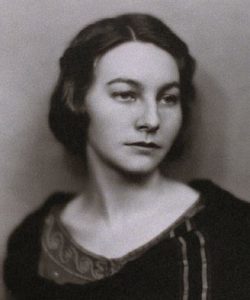
The Vast Hour
All essences of sweetness from the white
Warm day go up in vapor, when the dark
Comes down. Ascends the tune of meadow-lark,
Ascends the noon-time smell of grass, when night
Takes sunlight from the world, and gives it ease.
Mysterious wings have brushed the air; and light
Float all the ghosts of sense and sound and sight;
The silent hive is echoing the bees.
So stir my thoughts at this slow, solemn time.
Now only is there certainty for me
When all the day’s distilled and understood.
Now light meets darkness: now my tendrils climb
In this vast hour, up the living tree,
Where gloom foregathers, and the stern winds brood.
Genevieve Taggard
(1894 – 1948)
The Vast Hour
• fleursdumal.nl magazine
More in: # Classic Poetry Archive, Archive S-T, Archive S-T

En la forest de Longue Attente
En la forest de Longue Attente
Entrée suis en une sente
Dont oster je ne puis mon cueur,
Pour quoy je vis en grant langueur,
Par Fortune qui me tourmente.
Souvent Espoir chacun contente,
Excepté moy, povre dolente,
Qui nuit et jour suis en douleur
En la forest de Longue Attente.
Ay je dont tort, se je garmente
Plus que nulle qui soit vivante ?
Par Dieu, nannil, veu mon malheur,
Car ainsi m’aid mon Createur
Qu’il n’est peine que je ne sente
En la forest de Longue Attente.
Marie De CLÈVES
(1426-1487)
En la forest de Longue Attente
• fleursdumal.nl magazine
More in: # Classic Poetry Archive, Archive C-D, Archive C-D

Skull Song
A sea-god, whose father had been a mortal, becomes a skeleton.
The skin of the sea was thick, to-night,
And the tone of the sea was dull;
When I found by the edge of the sullen sea
The half of a sea-god’s skull.
Half of a sea-god’s skull was there,
Half of a sea-god’s tail.
When I dug them out of the clutch of the sand
The peering moon went pale.
The peering moon went pale, because
Her other eye had seen
The other half of the sea-god’s bones
Ten thousand fathom green . . .
Ten thousand fathom green with sea,
The sea-god’s other bones
Swayed in a dead sea-goddess’s arms
On a pile of sea-washed stones.
The skin of the sea was thick, to-night,
And the tone of the sea was dull,
While I buried away from the sinister sea
All the mortal part of a skull.
Genevieve Taggard
(1894 – 1948)
Skull Song
• fleursdumal.nl magazine
More in: # Classic Poetry Archive, Archive S-T, Archive S-T
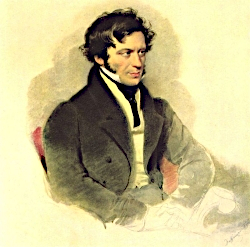
Nichts
Zwischen nichts wissen und Nichts wissen –
In diese zwei Teile ist die Menschheit zerrissen.
Aber Nichts wissen
Ist fruchtlos bis zum Tode beflissen,
Indeß nichts wissen
Ein gottgefälliges Ruhekissen.
Franz Seraphicus Grillparzer
(Wien 1791 – 1872)
Nichts
• fleursdumal.nl magazine
More in: # Classic Poetry Archive, Archive G-H, Archive G-H, Grillparzer, Franz

The Rights of Women
Yes, injured Woman! rise, assert thy right!
Woman! too long degraded, scorned, opprest;
O born to rule in partial Law’s despite,
Resume thy native empire o’er the breast!
Go forth arrayed in panoply divine;
That angel pureness which admits no stain;
Go, bid proud Man his boasted rule resign,
And kiss the golden sceptre of thy reign.
Go, gird thyself with grace; collect thy store
Of bright artillery glancing from afar;
Soft melting tones thy thundering cannon’s roar,
Blushes and fears thy magazine of war.
Thy rights are empire: urge no meaner claim,—
Felt, not defined, and if debated, lost;
Like sacred mysteries, which withheld from fame,
Shunning discussion, are revered the most.
Try all that wit and art suggest to bend
Of thy imperial foe the stubborn knee;
Make treacherous Man thy subject, not thy friend;
Thou mayst command, but never canst be free.
Awe the licentious, and restrain the rude;
Soften the sullen, clear the cloudy brow:
Be, more than princes’ gifts, thy favours sued;—
She hazards all, who will the least allow.
But hope not, courted idol of mankind,
On this proud eminence secure to stay;
Subduing and subdued, thou soon shalt find
Thy coldness soften, and thy pride give way.
Then, then, abandon each ambitious thought,
Conquest or rule thy heart shall feebly move,
In Nature’s school, by her soft maxims taught,
That separate rights are lost in mutual love.
Anna Laetitia Barbauld
(1743 – 1825)
The Rights of Women
Anna Laetitia Barbauld wrote this poem in 1793,
in response to Mary Wollstonecraft’s ‘A Vindication of the Rights of Woman´.
• fleursdumal.nl magazine
More in: # Classic Poetry Archive, Archive A-B, Archive A-B, Feminism, The Ideal Woman

Blind Old Milton
Place me once more, my daughter, where the sun
May shine upon my old and time-worn head,
For the last time, perchance. My race is run;
And soon amidst the ever-silent dead
I must repose, it may be, half forgot.
Yes! I have broke the hard and bitter bread
For many a year, and with those who trembled not
To buckle on their armor for the fight,
And set themselves against the tyrant’s lot;
And I have never bowed me to his might,
Nor knelt before him — for I bear within
My heart the sternest consciousness of right,
And that perpetual hate of gilded sin
Which made me what I am; and though the stain
Of poverty be on me, yet I win
More honor by it, than the blinded train
Who hug their willing servitude, and bow
Unto the weakest and the most profane.
Therefore, with unencumbered soul I go
Before the footstool of my Maker, where
I hope to stand as undebased as now!
Child! is the sun abroad? I feel my hair
Borne up and wafted by the gentle wind,
I feel the odors that perfume the air,
And hear the rustling of the leaves behind.
Within my heart I picture them, and then
I almost can forget that I am blind,
And old, and hated by my fellow-men.
Yet would I fain once more behold the grace
Of nature ere I die, and gaze again
Upon her living and rejoicing face —
Fain would I see thy countenance, my child,
My comforter! I feel thy dear embrace —
I hear thy voice, so musical and mild,
The patient sole interpreter, by whom
So many years of sadness are beguiled;
For it hath made my small and scanty room
Peopled with glowing visions of the past.
But I will calmly bend me to my doom,
And wait the hour which is approaching fast,
When triple light shall stream upon mine eyes,
And heaven itself be opened up at last
To him who dared foretell its mysteries.
I have had visions in this drear eclipse
Of outward consciousness, and clomb the skies,
Striving to utter with my earthly lips
What the diviner soul had half divined,
Even as the Saint in his Apocalypse
Who saw the inmost glory, where enshrined
Sat He who fashioned glory. This hath driven
All outward strife and tumult from my mind,
And humbled me, until I have forgiven
My bitter enemies, and only seek
To find the straight and narrow path to heaven.
Yet I am weak — oh! how entirely weak,
For one who may not love nor suffer more!
Sometimes unbidden tears will wet my cheek,
And my heart bound as keenly as of yore.
Responsive to a voice, now hushed to rest,
Which made the beautiful Italian shore,
In all its pomp of summer vineyards drest,
And Eden and a Paradise to me.
Do the sweet breezes from the balmy west
Still murmur through thy groves, Parthenope,
In search of odors from the orange bowers?
Still, on thy slopes of verdure, does the bee
Cull her rare honey from the virgin flowers?
And Philomel her plaintive chaunt prolong
‘Neath skies more calm and more serene than ours,
Making the summer one perpetual song?
Art thou the same as when in manhood’s pride
I walked in joy thy grassy meads among,
With that fair youthful vision by my side,
In whose bright eyes I looked — and not in vain?
O my adorèd angel! O my bride!
Despite of years, and woe, and want, and pain,
My soul yearns back towards thee, and I seem
To wander with thee, hand in hand, again,
By the bright margins of that flowing stream.
I hear again thy voice, more silver-sweet
Than fancied music floating in a dream,
Possess my being; from afar I greet
The waving of thy garments in the glade,
And the light rustling of thy fairy feet —
What time as one half eager, half afraid,
Love’s burning secret faltered on my tongue,
And tremulous looks and broken words betrayed
The secret of the heart from whence they sprung.
Ah me! the earth that rendered thee to heaven
Gave up an angel beautiful and young,
Spotless and pure as snow when freshly driven;
A bright Aurora for the starry sphere
Where all is love, and even life forgiven.
Bride of immortal beauty — ever dear!
Dost thou await me in thy blest abode!
While I, Tithonus-like, must linger here,
And count each step along the rugged road;
A phantom, tottering to a long-made grave.
And eager to lay down my weary load.
I who was fancy’s lord, am fancy’s slave.
Like the low murmurs of the Indian shell
Ta’en from its coral bed beneath the wave,
Which, unforgetful of the ocean’s swell,
Retains within its mystic urn the hum
Heard in the sea-grots where Nereids dwell —
Old thoughts still haunt me — unawares they come
Between me and my rest, nor can I make
Those aged visitors of sorrow dumb.
Oh, yet awhile, my feeble soul, awake!
Nor wander back with sullen steps again;
For neither pleasant pastime canst thou take
In such a journey, nor endure the pain.
The phantoms of the past are dead for thee;
So let them ever uninvoked remain,
And be thou calm, till death shall set thee free.
Thy flowers of hope expanded long ago,
Long since their blossoms withered on the tree:
No second spring can come to make them blow,
But in the silent winter of the grave
They lie with blighted love and buried woe.
I did not waste the gifts which nature gave,
Nor slothful lay in the Circean bower;
Nor did I yield myself the willing slave
Of lust for pride, for riches, or for power.
No! in my heart a nobler spirit dwelt;
For constant was my faith in manhood’s dower;
Man — made in God’s own image — and I felt
How of our own accord we courted shame,
Until to idols like ourselves we knelt,
And so renounced the great and glorious claim
Of freedom, our immortal heritage.
I saw how bigotry, with spiteful aim,
Smote at the searching eyesight of the sage;
How Error stole behind the steps of Truth,
And cast delusion on the sacred page.
So, as a champion, even in early youth
I waged by battle with a purpose keen:
Nor feared the hand of terror, nor the tooth
Of serpent jealousy. And I have been
With starry Galileo in his cell —
That wise magician with the brow serene,
Who fathomed space; and I have seen him tell
The wonders of the planetary sphere,
And trace the ramparts of heaven’s citadel
On the cold flag-stones of his dungeon drear.
And I have walked with Hampden and with Vane —
Names once so gracious to an English ear —
In days that never may return again.
My voice, though not the loudest, hath been heard
Whenever freedom raised her cry of pain,
And the faint effort of the humble bard
Hath roused up thousands from their lethargy,
To speak in words of thunder. What reward
Was mine, or theirs? It matters not; for I
am but a leaf cast on the whirling tide,
Without a hope or wish, except to die.
But truth, asserted once, must still abide,
Unquenchable, as are those fiery springs
Which day and night gush from the mountain-side,
Perpetual meteors girt with lambent wings,
Which the wild tempest tosses to and fro,
But cannot conquer with the force it brings.
Yet I, who ever felt another’s woe
More keenly than my own untold distress;
I, who have battled with the common foe,
And broke for years the bread of bitterness;
Who never yet abandoned or betrayed
The trust vouchsafed me, nor have ceased to bless,
Am left alone to wither in the shade,
A weak old man, deserted by his kind —
Whom none will comfort in his age, nor aid!
Oh, let me not repine! A quiet mind
Conscious and upright, needs no other stay;
Nor can I grieve for what I leave behind,
In the rich promise of eternal day.
Henceforth to me the world is dead and gone,
Its thorns unfelt, its roses cast away:
And the old pilgrim, weary and alone,
Bowed down with travel, at his Master’s gate
Now sits, his task of life-long labor done,
Thankful for rest, although it comes so late,
After sore journey through the world of sin,
In hope, and prayer, and wistfulness to wait,
Until the door shall ope, and let him in.
William Edmondstoune Aytoun
(1813 — 1865)
Blind Old Milton
• fleursdumal.nl magazine
More in: # Classic Poetry Archive, Archive A-B, Archive A-B, Milton, John
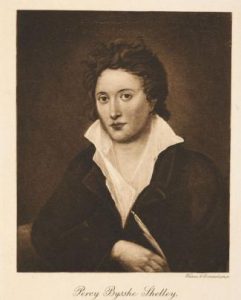
O! there are spirits of the air
O! there are spirits of the air
And genii of the evening breeze,
And gentle ghosts, with eyes as fair
As star-beams among twilight trees:—
Such lovely ministers to meet
Oft hast thou turned from men thy lonely feet.
With mountain winds, and babbling springs,
And moonlight seas, that are the voice
Of these inexplicable things
Thou didst hold commune, and rejoice
When they did answer thee; but they
Cast, like a worthless boon, thy love away.
And thou hast sought in starry eyes
Beams that were never meant for thine
Another’s wealth:—tame sacrifice
To a fond faith I still dost thou pine!
Still dost thou hope that greeting hands,
Voice, looks, or lips, may answer thy demands!
Ah! wherefore didst thou build thine hope
On the false earth’s inconstancy!
Did thine own, mind afford no scope
Of love, or moving thoughts to thee!
That natural scenes or human smiles
Could steal the power to wind thee in their wiles.
Yes, all the faithless smiles are fled
Whose falsehood left thee broken-hearted;
The glory of the moon is dead;
Night’s ghosts and dreams have now departed;
Thine own soul still is true to thee,
But changed to a foul fiend through misery.
This fiend, whose ghastly presence ever
Beside thee like thy shadow hangs,
Dream not to chase;—the mad endeavour
Would scourge thee to severer pangs.
Be as thou art. Thy settled fate,
Dark as it is, all change would aggravate.
Percy Bysshe Shelley
(1792 – 1822)
O! there are spirits of the air
1886
• fleursdumal.nl magazine
More in: # Classic Poetry Archive, Archive S-T, Archive S-T, Shelley, Percy Byssche
Thank you for reading Fleurs du Mal - magazine for art & literature